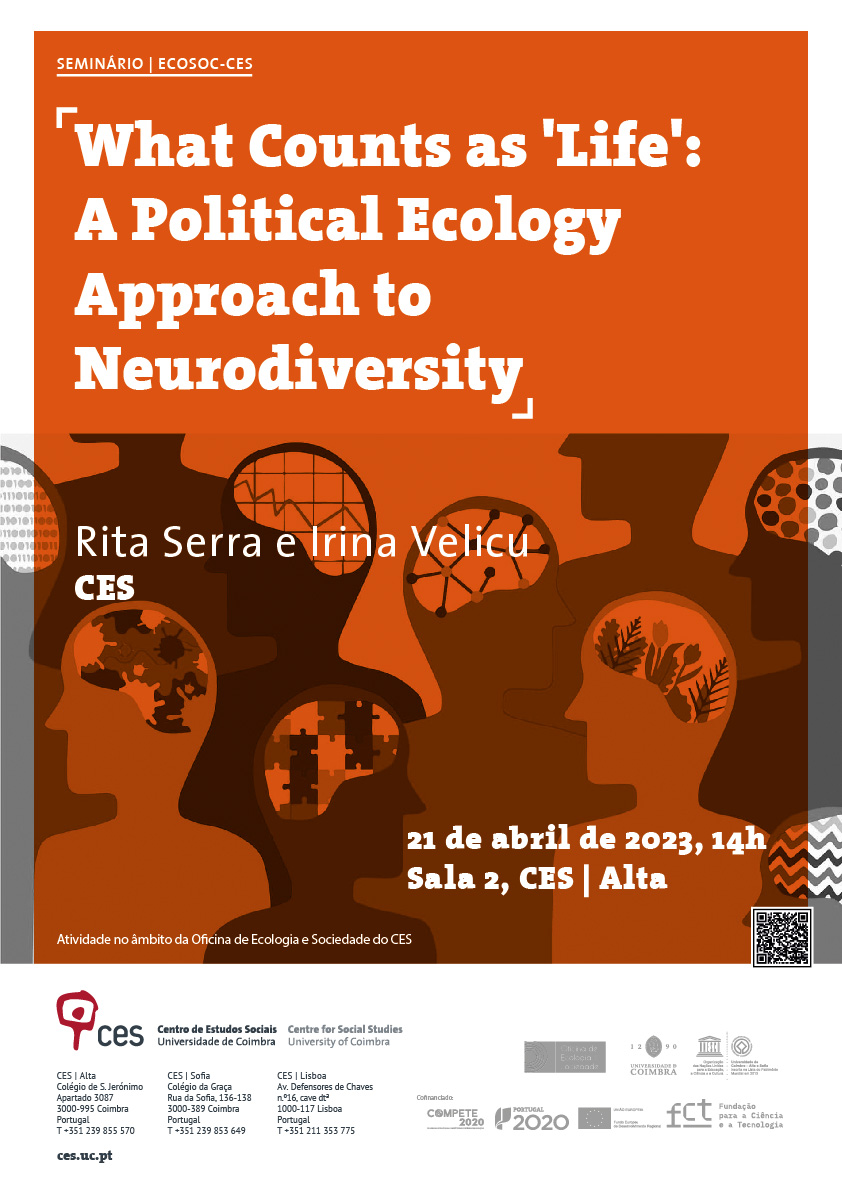ECOSOC - Oficina de Ecologia e Sociedade
Seminar | ecosoc-ces
What Counts as 'Life': A Political Ecology Approach to Neurodiversity
Irina Velicu
Rita Serra
April 21, 2023, 14h00
Room 2, CES | Alta
About
In the places where Mastotermes Darwiniensis dominate, intensive agriculture is not possible: their ability to found new colonies inspired Smeathman to ´repatriate´ Black poor to Sierra Leone. Climate change may allow these termites to expand their territory, potentially releasing more carbon dioxide while preventing us from releasing our own. In ´more-than-human´ times, biology offers an opportunity to shift the question of Being from metaphor to metamorphosis: in order to inhabit the bacterias, the skin or the bones of Life, we start from the premise that Being (ontology) is liquid. In biology, what counts as a living being is not closed: a cockroach is a living-thinking being, at home with itself. When humans call another creature a ´cockroach´, genocide may happen.
While social sciences are interested in multiplying ontologies and epistemologies, the question of ´what counts as Life´ is being operationalized by scientists interested in Artificial Life and Zombification. While biology does not grant privileges to any final answer on the Being, social science continues to operate premised on fixed categories/identities as images of Being. These are socially limiting symbiosis to strategic cooperation. We will reflect on various images of symbiosis and subsumption or how the fluidity of life allows for some forms to become non-being and what remains unrepresented or misinterpreted in this process. In pursuit of a political ecology approach to neurodiversity, we will look at what counts as ´non-life´ in biodiversity, the diminishing of life properties and objectification. We reflect on ´ontology´ as existence without a name, how social sciences may not require a general theory of the ´subject´ and on ´ontogenesis´ or becoming into more-than-human beings.
The conversation is building on the three Essays of Life, published by Maria de Assunção (heteronym of Rita) in the journal O Osso, and drawing on the ´ecology of selves´ of Eduardo Kohn and the ´cyborg´ of Donna Haraway.
Bio notes
Rita Serra, biologist. PhD on the fungi of industrially-relevant cultures (wine grapes and cork stoppers). CES researcher since 2008. Currently, I am the participatory research manager of "BioD'Agro - 4.0 agriculture at the natural park of International Douro" and board member of APVA - Portuguese Association Voice of the Autistic. My interests span over science and technology studies, human relationships with living and non-living creatures (ecologies of selves and feral biologies) and technological devices. I am engaged with first-person perspectives and self-advocacy in autism and neurodiversity research.
Irina Velicu is a Researcher working on socio-environmental conflicts in post-communist Europe at the Center for Social Studies, University of Coimbra, Portugal. She is currently the Principle Investigator of the JustFood FCT project, expanding her work by looking at food justice. Dr. Velicu is a member of the POSTRADE nucleus and of ECOSOC, looking at the intersections of social and environmental justice. She holds a PhD in Political Science from the University of Hawaii (USA) and an MA in International Studies from the University of Warwick (UK). Her work has received funding from national and international research organisations (including the EU-FCT, Marie Curie, Chevening Dr. Velicu worked as a Marie Curie Experienced Researcher within the ENTITLE European Network of Political Ecology. Her recent publications can be found in Environmental Politics, Theory, Culture and Society, Ecological Economics, Geoforum, New Political Science, Globalizations.


